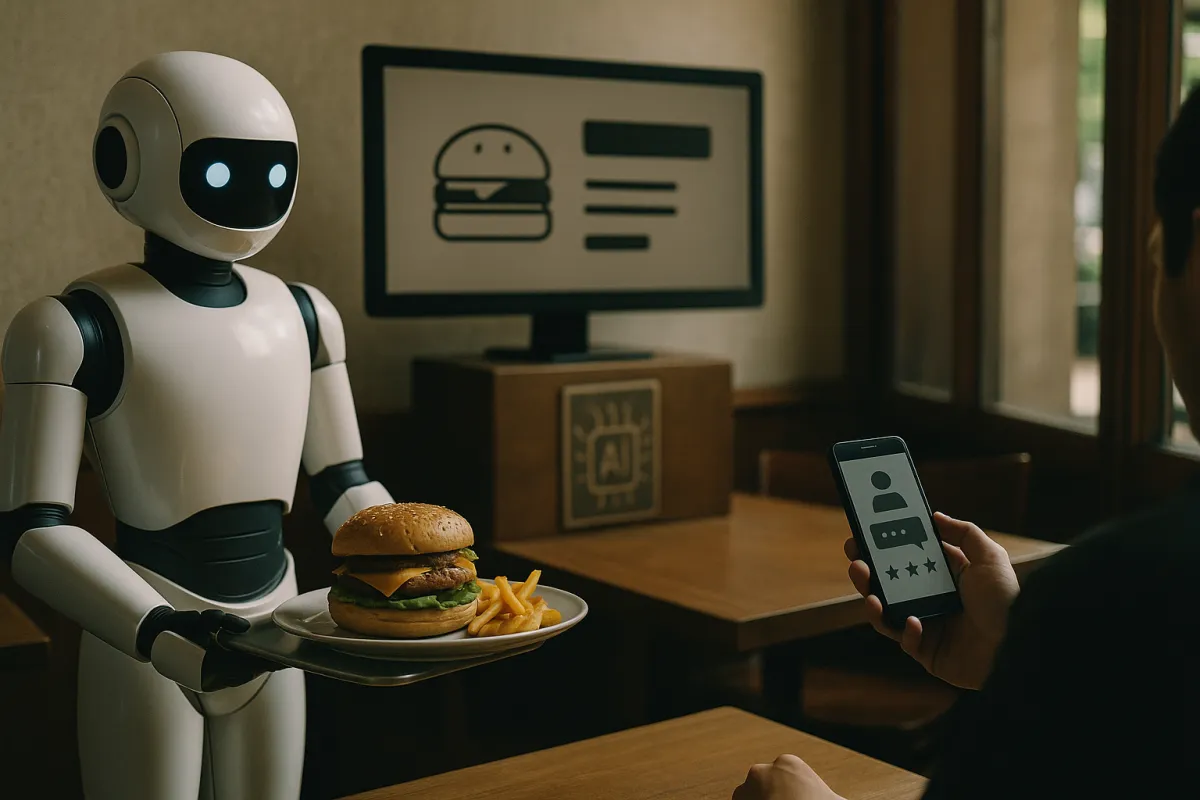Obsessed with the success of independent hospitality brands.
Imagine transforming your hospitality business into a seamlessly efficient operation with happier staff and loyal customers, all through the power of AI and automation.
Kinetic Management Systems, or KMS, is an integrated solution specifically designed for hospitality operators looking to scale their businesses.
Jason Littrell, a hospitality management consultant has over a decade of real world experience helping bars and restaurants increase their profitability and streamline their operations.
We've seen firsthand how these challenges can limit the success of even the most passionate operators. We care about helping you achieve your full potential because we believe in the impact a well-run hospitality business can have on its community and its employees.
By leveraging KMS, you have the opportunity to boost your revenue by up to 30% within just three months, while reducing operational headaches and enhancing guest satisfaction.
To get started, visit our website and sign up for a free demo. Our team will walk you through the system and show you how KMS can be tailored to meet your unique needs.
We're not just offering a set of tools; we're providing a path to a more profitable and enjoyable business. This is a movement towards smarter, more efficient hospitality management, and we want you to be a part of it. Whether you join us now or later, the shift towards automation and AI is happening. We'd love to have you with us from the start.
Core Values
1. Innovation:
We continuously seek and implement cutting-edge technology to provide independent restaurants and spirits brands with the most effective tools for success.
2. Integrity:
We operate with honesty and transparency, ensuring our clients receive genuine value and trustworthy support.
3. Collaboration:
We believe in the power of teamwork, both within our organization and with our clients, to achieve shared goals and create a supportive community.
4. Excellence:
We are committed to delivering the highest quality services and support, striving for excellence in everything we do to elevate our clients' businesses.
5. Client-Centric:
Our clients' needs and success are at the heart of our business. We tailor our solutions to meet their specific challenges and objectives, ensuring personalized and impactful results. Solving the problem will always be the direction of our products and services.
6. Adaptability:
We embrace change and are agile in our approach, ready to adapt to the evolving needs of the hospitality and spirits industries.
7. Sustainability:
We promote sustainable business practices that benefit not only our clients but also the broader community and environment, supporting long-term success and responsible growth.
8. Continuous Improvement:
We are dedicated to learning and growing, constantly enhancing our coaching, strategy, systems, and support to better serve independent restaurants and spirits brands.
9. Empowerment:
We aim to empower our clients with the knowledge, tools, and support they need to independently drive their businesses forward, fostering a culture of self-reliance and innovation.
10. Strategic Guidance:
We provide insightful and actionable strategies to help our clients navigate their business challenges and achieve their goals effectively.
11. Comprehensive Support:
Our commitment to ongoing support ensures that our clients always have the assistance they need to implement and sustain our solutions successfully.

The Complete Guide to AI for Restaurants in 2025
Running a restaurant has always been a game of inches. Margins are thin, labor is unpredictable, and customer expectations keep climbing. In 2025, the operators who last are the ones who get serious about data and systems. Artificial Intelligence isn’t a shiny new toy—it’s a tool. Used right, it takes the pressure off staff, plugs the leaks in marketing, and gives you better information to make decisions.
This guide covers where AI is already being used in restaurants, what’s working, and what to watch in the next few years.
1. Why AI Is on the Menu Now
The restaurant industry has been forced to get leaner. Costs are up, labor is down, and most operators can’t afford to waste time or money. At the same time, customers expect a level of personalization that used to only come from big-budget brands.
According to The Business Research Company, AI in hospitality is expected to grow at over 15% annually through 2030. That’s not because restaurants want more tech—it’s because they need it.
Key drivers in 2025:
Labor shortages: Operators need to do more with fewer people.
Rising expectations: Guests are used to Netflix-level personalization.
Data abundance: Restaurants now collect mountains of data (reservations, reviews, orders, Wi-Fi sign-ins) but rarely use it. AI makes that data useful.
2. Guest Experience: Front-of-House AI
Hospitality is still about people, but AI is filling the cracks where staff can’t.
Smarter Reservations and Seating
Systems like SevenRooms or Resy’s AI-assisted waitlist optimize seating, reduce no-shows, and increase turns.
Example: A mid-sized New York bistro used AI-driven reservations to cut no-shows by 20% after implementing deposit prompts based on risk scoring.
Personalized Touchpoints
Recommendation engines suggest food, drink, or upsells based on order history.
Loyalty systems can nudge guests with relevant offers (“Welcome back, Jason. Last time you had the ribeye—try our porterhouse special tonight.”).
Conversation AI
Missed-call text-back is one of the simplest and highest-ROI AI tools for restaurants. According to Hospitality Tech, more than half of potential guests will never call back if they don’t reach you the first time. AI-driven replies mean those calls convert into bookings instead of lost revenue.
3. Back-of-House: Smarter Operations
Behind the scenes, AI is reducing guesswork.
Inventory and Waste
Predictive ordering tools flag over-ordering and adjust par levels automatically.
Chains like Chipotle are piloting AI-assisted prep systems to track ingredient use in real time.
Kitchen Scheduling
AI-based forecasting systems use historical sales and weather data to predict traffic.
A Chicago QSR reported saving 8% on labor costs after adopting AI scheduling that lined staff up with actual demand.
Food Safety and Prep
AI sensors in walk-ins monitor temperature and send alerts before spoilage.
Recipe AI assists line cooks with portion control and prep instructions, maintaining consistency.
4. Marketing and Loyalty Systems
This is where AI is becoming most accessible for independents.
Automated Campaigns
Email and SMS systems trigger on birthdays, anniversaries, and lapsed visits.
Example: One regional Mexican concept ran an AI-driven reactivation campaign and saw a 12% boost in guest return rate in 30 days.
Smarter Offers
Instead of blanket discounts, AI systems segment offers by guest value. VIPs get access to new menus; casuals get first-time perks.
According to Hospitality Technology, hotels using AI-driven loyalty personalization see up to 30% higher engagement. Restaurants are following the same path.
Tracking Without POS Integration
Trigger links or QR codes allow operators to track offer redemptions without a clunky POS hookup.
Independent operators finally have a way to see if offers actually drive revenue.
5. Online Reputation and Visibility
Reviews and search ranking are the new word-of-mouth. AI makes managing both manageable.
Review Response Automation
AI-generated replies handle the volume, but can be personalized with guest names and context.
Studies show faster review responses lead to better ratings and repeat visits.
Local SEO
AI SEO tools suggest keywords and track performance.
With Google rolling out AI Overviews, content that directly answers questions (“best Italian in the East Village with outdoor seating”) is more likely to be pulled into search.
6. Measuring ROI in Plain English
AI sounds expensive until you measure it. The metrics that matter:
Guest Retention Rate – are people coming back?
Offer Redemption Rate – did the promo actually drive visits?
Average Check Size – are upsells working?
Labor Cost % – are smarter schedules saving money?
Waste % – are you throwing away less?
Case Example: A 3-unit bar group installed AI-driven SMS campaigns and a review manager. Within 90 days:
800+ guest records added,
200+ reviews generated,
14% higher guest return rate,
measurable ROI of 7:1 on campaign spend.
7. Looking Ahead (2025–2030)
AI in restaurants isn’t about robots taking over. It’s about incremental, compounding gains:
Hyper-personalization – Guests will expect menus, offers, and service to reflect their preferences.
AI-powered loyalty ecosystems – No more punch cards; loyalty will be tracked seamlessly through phone numbers, links, and behavior.
System-first operations – The restaurants that last will build processes around data, not gut feeling.
AI for restaurants in 2025 isn’t about futuristic tech—it’s about survival and scale. Operators who embrace it don’t become “tech companies.” They simply become better operators.
The bottom line: you don’t need to install robots or spend millions. Start with review responses, loyalty offers, and missed-call text-back. Once the foundation is in place, layer on forecasting and data-driven decisions.
The restaurants that build these systems today will own the next decade of hospitality.
About KMS

Jason Littrell - Management Consultant & Industry Innovator
With over two decades of experience in the hospitality industry, Jason Littrell has established himself as a leading consultant and strategist, specializing in helping bars and restaurants maximize their efficiency and profitability. His expertise spans a wide range of essential areas, including operational management, staff training, customer experience, and technology integration.
Jason is the founder of Kinetic Management Systems, a cutting-edge suite of tools designed to automate and optimize the day-to-day operations of hospitality businesses. Through his systems, Jason offers solutions for everything from staff recruitment and onboarding to customer retention and feedback management. His approach combines innovative technology with proven strategies to deliver results that are both measurable and scalable.
A passionate educator and speaker, Jason regularly hosts workshops and seminars, sharing his knowledge on how to leverage AI and automation to thrive in a competitive market. His insights are rooted in practical experience, having worked on the ground in various capacities within the industry—from bartender to manager, and now, consultant.
Jason also manages a vibrant online community, "Bar Teams," where he fosters discussions and collaboration among hospitality professionals. Here, members gain access to exclusive content, including training sessions, industry news, and peer support.
His commitment to excellence and innovation in hospitality has not only transformed the operations of numerous establishments but has also inspired many to pursue and achieve greater success. Jason's work is driven by a core belief: that the right mix of people, processes, and technology can turn any hospitality business into a thriving, profitable enterprise.


